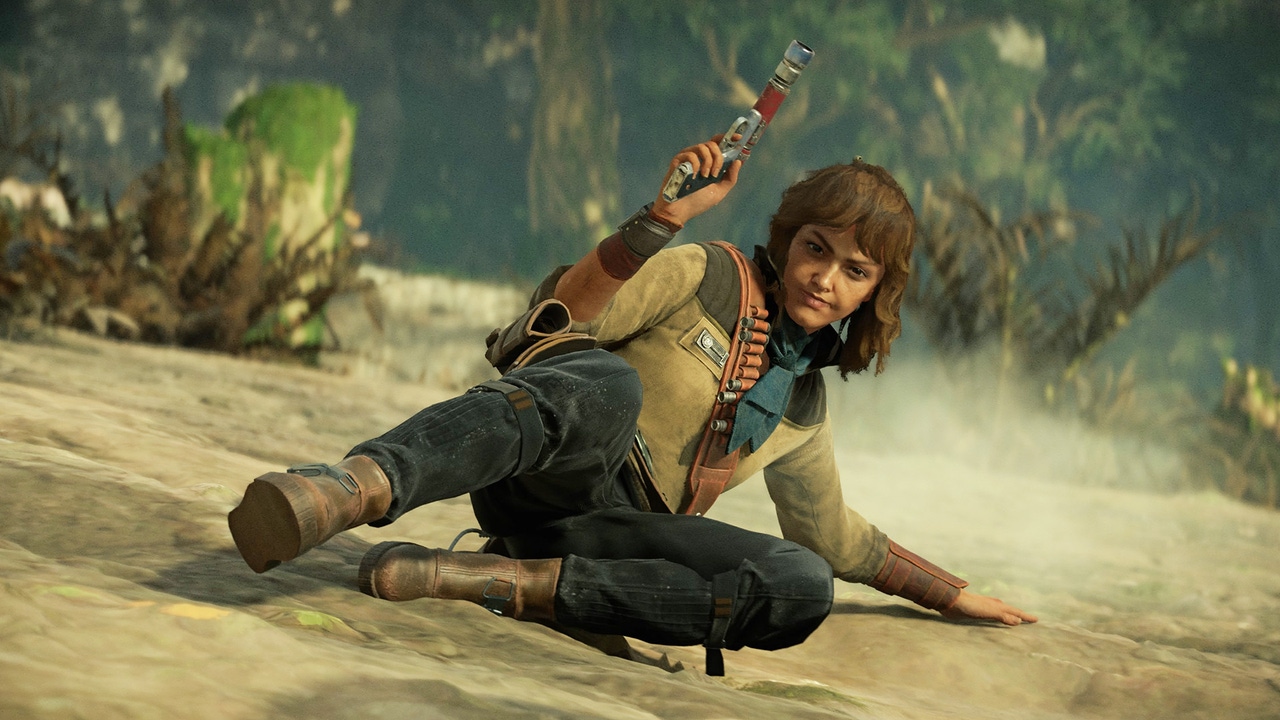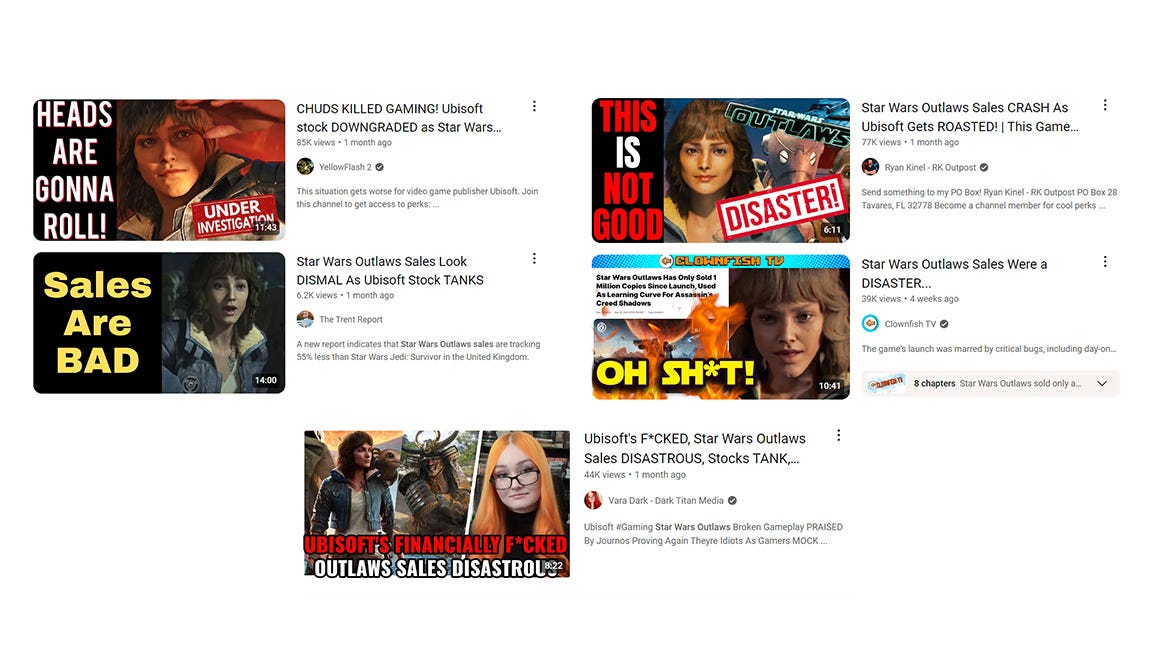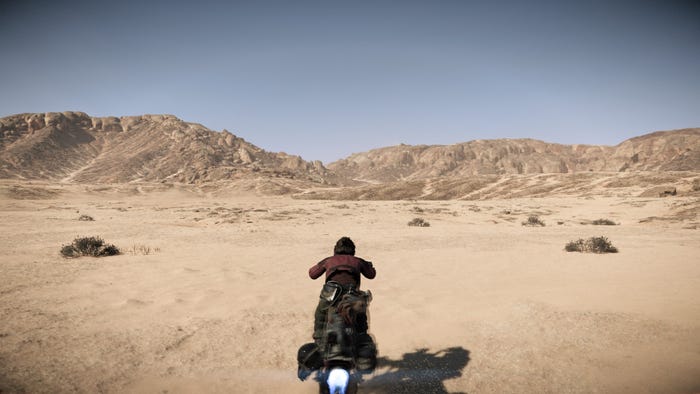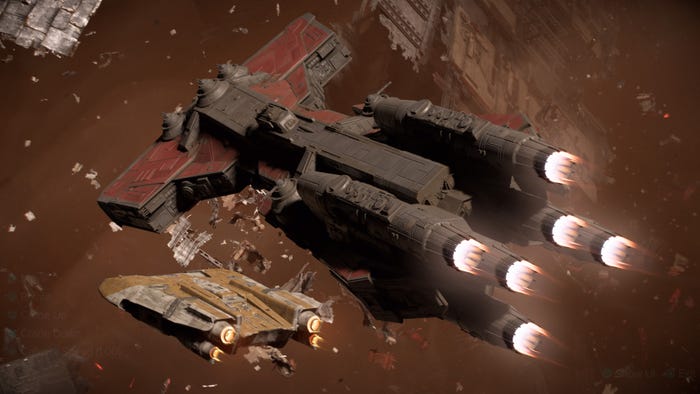Trending
Opinion: How will Project 2025 impact game developers?
The Heritage Foundation's manifesto for the possible next administration could do great harm to many, including large portions of the game development community.

Featured Blog | This community-written post highlights the best of what the game industry has to offer. Read more like it on the Game Developer Blogs or learn how to Submit Your Own Blog Post
"The greatest teacher, failure is."

In 2013 I fell in love with the Guillermo del Toro-directed film Pacific Rim. I thought it was going to be this big, earthshaking cinematic moment that would reshape blockbuster cinema. I was wrong. It was beat by the Adam Sandler vehicle Grown Ups 2.
After that, I realized I could stop worrying about box office numbers as a marker of quality. It's made much of my life less stressful.
I've largely taken the same attitude with video game sales, and the underperformance of Star Wars Outlaws (which drove Ubisoft to delay Assassin's Creed Shadows and announce it would launch day 1 on Steam) didn't initially faze me. I broadly enjoyed the game even if I found parts of it underwhelming. Why worry about whether it not it sold well, even if a seemingly endless array of YouTubers did?

Image via YouTube
Yet something itched at me. I've had my eye on the game for the last year and kept up with all the moments leading up through its release. I couldn't have done anything to predict its sales prospects but hindsight being 20/20, the variables were all right there. Could this poor performance have been avoided?
Perhaps. It's too late for Outlaws, but its sales struggles make for a fascinating case study for other business and marketing professionals who want their game to sell well. There were three main warning signs leading up to release—all of them variables Ubisoft had plenty of time to react to.
As the resident Star Wars fanatic at Game Developer, it brings me great shame to report that yes, audiences are experiencing what some are calling "Star Wars fatigue." The underperformance of Outlaws and the recent Disney+ series The Acolyte are the measuring stick we have to work with. For the sake of my sanity, let us again skip past debating the quality of these works, I ultimately liked The Acolyte even if it was flawed as hell.
The reason to push aside concerns over quality here is that quality is not the sole marker for success in this series. The Star Wars prequels were widely derided as they released but were all blockbuster hits. Solo: A Star Wars story reviewed well and is a solid little heist film but also whiffed at the box office. Andor is the most critically acclaimed entry since Star Wars Episode VIII: The Last Jedi but didn't set the world on fire. Quality doesn't not matter but we have data indicating it's at least a little disconnected.
My personal opinion is that quality, marketing strategy, and release timing all mix into the stew here. But whichever one you prioritize, we're left with an unfortunate status quo for Ubisoft: that the Star Wars name wasn't enough to send players rushing to pre-order the game.
This fact is relevant because for the last few years we've been in an era where supposedly Hollywood and the video game community have finally cracked the adaptation code and freed us from the era of terrible licensed games. We've heard so much about flywheels and comarketing and other business words that seem to forget works across both industries are creative works that do not sell like physical products.
There've been some big wins, but Outlaws is the warning sign that we may be bracing for big losses too. Execs everywhere will assure you they know the brand name isn't enough, that quality has to be delivered, but let's state plain and clearly, we now have a big data point showing that softening enthusiasm for a series can have a big ripple effect.
Ubisoft really needs a wake-up call on this one because CEO Yves Guillemot and other executives have repeated over and over again that the company is narrowing its focus to live service multiplayer games and open world singleplayer games. Great, do what you want, but Outlaws is a big red flag that this strategy is running up against a crowded market.
Ubisoft has unfortunately done much of that crowding over the last decade by releasing a buffet table of high quality games across the Assassin's Creed and Far Cry series. If a player says "I'm in the mood for open-world action adventure," they can dive into Ubisoft's own archives and pick up, say, Assassin's Creed Syndicate on sale for $10-$20 and be satisfied through the upcoming release of Shadows.
Publishers are already aware of this phenomenon and adapting to it, but Ubisoft got caught off guard at a poor moment.

Image via Ubisoft Massive/Ubisoft
Does this mean all open world games are doomed? No. I think what we're seeing is data that players will drop $60-$70 for new kinds of open worlds, and are champing at the bit for games that shake up the experience. Dragon's Dogma 2 turned a cult series into a blockbuster bonanza, and Elden Ring adapted the Dark Souls model for a larger environment. Both games avoided the traditional model of "enter a new area, go through its main quest, explore checkpoints, pick up sidequests, and do small activities where appropriate" and experimented with making exploration a more friction-filled activity.
Ubisoft's open world strategy seems to have unfortunately come with a desire to industrialize game production—to create central sets of mechanics that all of its global studios can work with and create slight variations on. It's led to some fun games, but when Outlaws previews started landing our own contributor George Yang noted that the game's goal seemed to be to adapt this well-worn model to the world of Star Wars.
However well it did so (I found this was actually a major high point of the game), it was running headlong into a brick wall of Ubisoft's own making: Ubisoft offered players a type of game that it's already released so many versions of, and it was fair for them to say "I'll wait for it to go on sale."
Outlaws was well-received by critics—shouldn't that have boosted the odds of it having strong sales? That positive reception landed in a more complicated media environment.
I would not say Outlaws had "bad" word-of-mouth. What I will say is that word-of-mouth was...complicated.
Yes, there was the "anti-woke" backlash, but who cares, fifty or so weirdos yelling on Twitter doesn't represent the blockbuster game audience Ubisoft so maybe you shouldn't bend the knee to them. But it was certainly in the media ecosystem, so let's count it as a tiny negative for word-of-mouth.

Image via Ubisoft Massive/Ubisoft.
Next, there was the brouhaha over the game's pre-order model. This was fairly justified, as poor communication and high prices were good reason for sticker shock from prospective players. For a hot minute it was completely reasonable to interpret access to Jabba the Hutt's mission as being locked behind a paywall. Ubisoft rushed to clarify it, but the damage was done.
I'd rate this as a high negative point for the game's word-of-mouth because it drove conversation about the game's high price point. That doesn't pair well with the genre glut described above.
Finally there was the launch window word of mouth. This was a moment where positive reviews had their best chance to boost the game, but content creators and players encountered two issues that shifted the conversation: the game's early forced-stealth sequences, and a game-breaking bug that led to Ubisoft warning PlayStation players to delete their save files.
The difficulty of the early forced-stealth moments (which don't feel great, they seem to be a compromise between other interlocking game systems) became a complaint on social media. It was so prominent that creative director Julian Gerighty admitted in an interview with GamesRadar that it would soon be fixed. Now you have a conversation about a game not being fun, and a director saying a fix will come soon. So you'll just wait to buy it, right? Oh whoops now you've been distracted by another game and...that sale is gone.
To be clear I don't blame Gerighty here, this was a very difficult needle to thread. Unfortunately the difficulty itself is the issue.
Ubisoft's decision to not launch on Steam likely also hurt its ability to spread hype through word-of-mouth.
"It had a deal with the Epic Game Store," you'd reply. "Surely eager players would have gone there" The most passionate PC users probably did make the jump, but not renegotiating its Epic Game Store deal to support a PC launch here was a bad, bad move. Ubisoft seems to have realized this and is racing to get the game up on Steam and making sure Shadows launches on Valve's platform.
We can debate if the existing (if confounding, to me, personally) distaste for the Epic Store dampened enthusiasm there, but I find skipping Steam to be more about the missed opportunity than the sentiments about its competitor. How do you drive people to wishlist if you aren't on the platform where they build game wishlists? How do you get the algorithmic benefits of the Steam front page? If a friend tells a friend about the game, how do they quickly share it when they're on the same platform?
Ubisoft should have taken the L here and figured out whatever money they had to give back to Tim Sweeney to get Outlaws on Steam. This wasn't just about missed PC revenue—it was about a missed way for players to engage with the game.
First: greenlight Star Wars Outlaws 2, and work with LucasFilm licensing to get a broader creative palette to work with. Ubisoft Massive has a team of talented people who know what makes the game work, and they could absolutely build on what shined in the first game and make something better. Remember, it was Assassin's Creed II, not Assassin's Creed, that put the series on the map.
Second: figure out whoever did see these problems coming from a mile away, and find out why they weren't heard.
I've referred to "Ubisoft," the corporate entity in this story, but that phrase doesn't capture the nuance of a situation like this. Ubisoft the company is the one that lost out, but it's Ubisoft's workers who make the product, market the game, etc. etc. They're the first ones to know about soft discussion on social media, problems in the game that might dent reception, etc. I'm sure people knew about the problems. I suspect they weren't heard.
Investigations into Ubisoft's alleged culture of sexual harassment revealed that said culture went hand-in-hand with a power structure that regularly punished anyone who spoke up against leadership. Supposedly, bad actors at Ubisoft have been shown the door. But does the culture they enabled remain?
The fact that Ubisoft Board of Directors is launching a "review" of its practices signals they were badly caught off guard by Outlaws' underperforming. There's probably some level of ass-covering at play, but it sure doesn't sound like the work of a company that was prepared for a softer-than-expected launch.
Star Wars Outlaws had all the potential to be another blockbuster sales win for Ubisoft. I lurk in the Star Wars Outlaws subreddit, and every day there's at least one post by a player going "I thought this game was terrible because of the YouTube videos, but I tried it and loved it." It's a common enough phenomenon that I think this game is really going to find an audience in future years as it's picked up through Steam sales, like Avalanche Studios' Mad Max.
In the end I find picking through the debris of Outlaws' underperformance tiring. Star Wars is a big, bright, high-energy story that pits the dreamers against the cynics, and this is definitely a story where the cynics won. Too much time looking through their eyes can make it hard to dream.
But dream we should. Because the next great game—Star Wars or otherwise—is somewhere around the corner.
You May Also Like